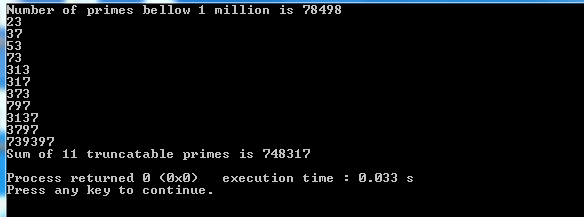The number 3797 has an interesting property. Being prime itself, it is possible to continuously remove digits from left to right, and remain prime at each stage: 3797, 797, 97, and 7. Similarly we can work from right to left: 3797, 379, 37, and 3.
Find the sum of the only eleven primes that are both truncatable from left to right and right to left.
Solution :
Here, for the number 3797 we have to check if these (3797,379,7,37,97,3,797) numbers are prime or not. If we carefully see these numbers we can find a easy procedure to truncate numbers.
Here is the procedure,
Here, for the number 3797 we have to check if these (3797,379,7,37,97,3,797) numbers are prime or not. If we carefully see these numbers we can find a easy procedure to truncate numbers.
Here is the procedure,
- 3797 / 10 = 379 and 3797 % 10 = 7
- 3797 / 100 = 37 and 3797 % 100 = 97
- 3797 / 1000 = 3 and 3797 % 1000 = 797
Here is the C++ implementation of the solution.
#include <cstdio>
#include <iostream>
using namespace std;
#define sz 1000001
#define mx 1001
bool p[sz];
long primeTable[78500],nPrime = 0;
void sieve(){
int i,j;
p[0] = p[1] = true;
for( i = 4; i <= sz; i += 2 )
p[i] = true;
primeTable[nPrime++] = 2;
for( i = 3; i <= mx; i += 2 ){
if(!p[i]){
primeTable[nPrime++] = i;
for( j = i * i; j <= sz; j += i )
p[j] = true;
}
}
for( i = mx + 2; i <= sz; i += 2 ){
if(!p[i]){
primeTable[nPrime++] = i;
}
}
}
bool isTruncatable(long n){
long pow = 10;
while( pow < n){
if(p[n%pow] || p[n/pow])
return false;
pow *= 10;
}
return true;
}
int main(){
long i,ans = 0;
sieve();
printf("Number of primes bellow 1 million is %ld\n",nPrime);
for( i = 4; i < nPrime; i++){
if( isTruncatable(primeTable[i]) ){
ans += primeTable[i];
printf("%ld\n",primeTable[i]);
}
}
printf("Sum of 11 truncatable primes is %ld\n",ans);
return 0;
}


No comments:
Post a Comment